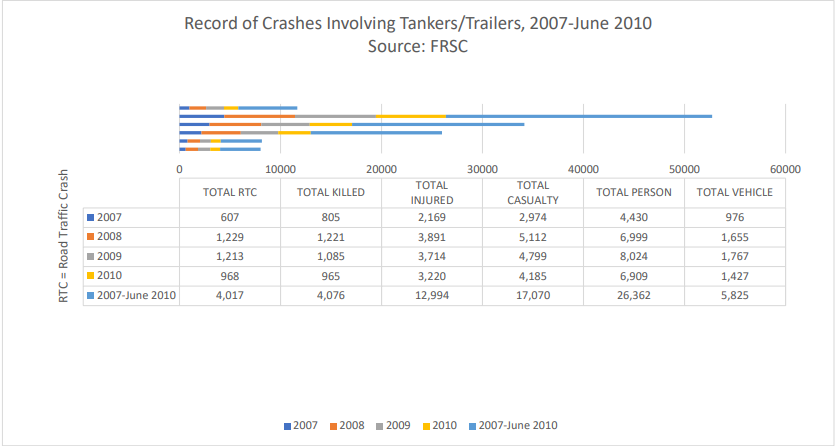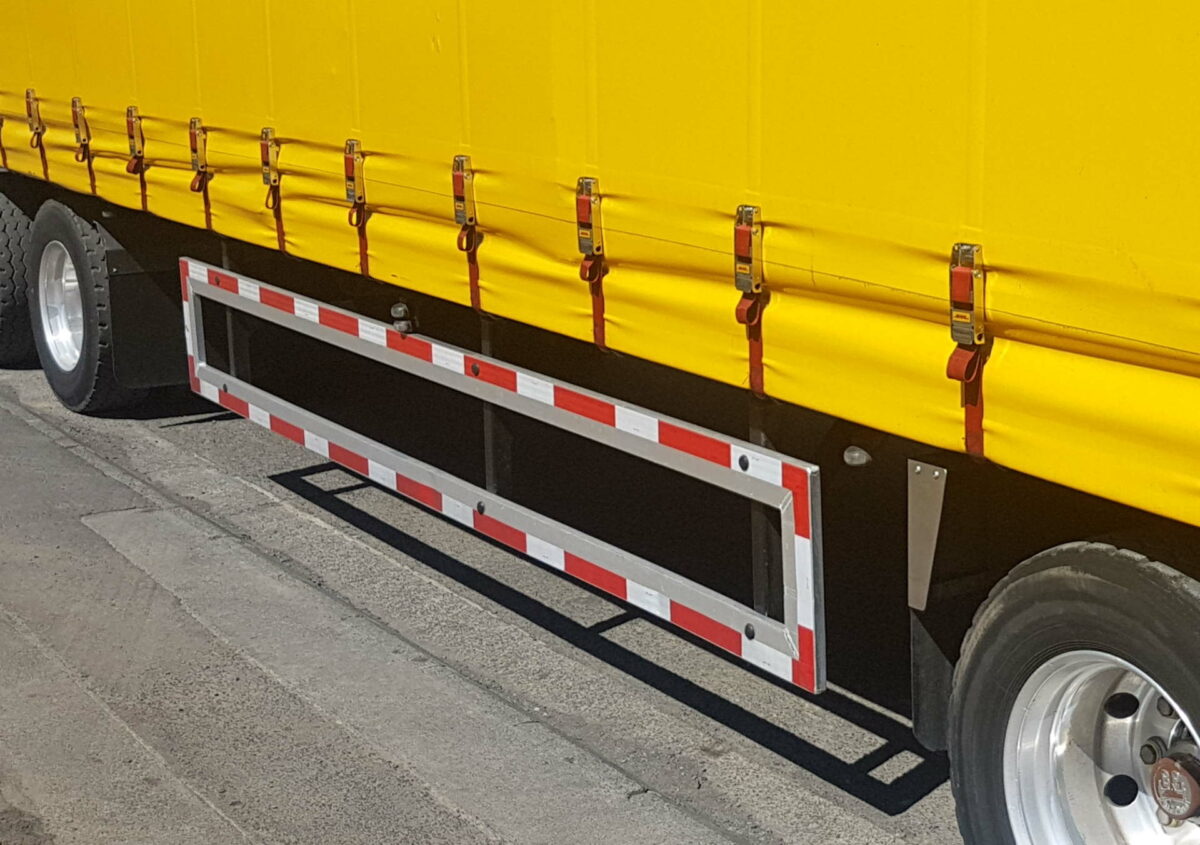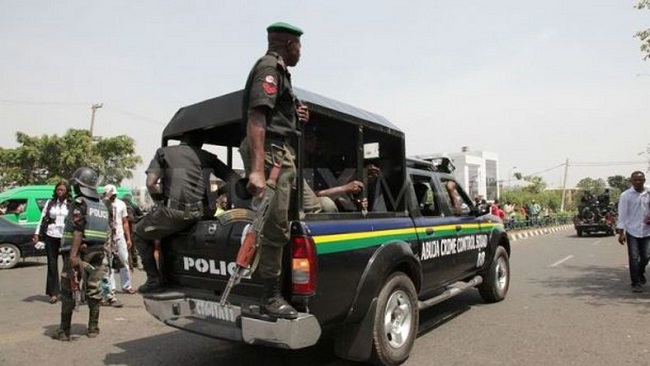There are road traffic crashes and there are road under-ride crashes. Under-ride crashes are not just a common phenomenon in Nigeria, but they are happening at an alarming rate now. Even though regulations are in place to arrest the situation, the failure of road safety regulators has eclipsed the intended goals of the law. In this report, SODEEQ ATANDA investigates how the failure of regulatory bodies and trucking companies has left thousands of Nigerians trapped under trucks.
Victor Abayomi, a former employee of the Revenue Mobilisation, Allocation and Fiscal Commission, was driving his superior at work from Abuja to Uso, an Ondo State community, on April 15, 2006. Also in the car were his superior’s three grandchildren. Some minutes’ drive to their destination, everyone in the car lost their lives.
Before setting out for the journey, he checked and ensured the car was roadworthy for the long trip. The journey was smooth for everyone in the vehicle until they were some minutes away to their destination. They had no idea something capable of terminating their lives had been recklessly planted on their way.
Abayomi drove until he got to Uso, but he had not reached his destination when death came. The sun was already shutting out when he encountered a truck parked by the roadside. He could not sway the wheel, so he rammed into the vehicle from the back. All of them found their deaths under the truck.
READ ALSO: 5 Years After Senior FRSC Official’s Death, Family Yet to Get Her Entitlements
“It was an incident I can never forget in my life,” Abayomi’s wife told FIJ.
Abayomi’s wife relived the moments before and after the news of the death of her itinerant husband was broken to her.
“He was a mechanic, and that was the nature of his job with RMFAC. The government had declared a public holiday for Easter celebration, and he was meant to drive Chief Abitogun, his superior, and his three grandchildren to Uso in the Ajowa Akoko area of Ondo State.

“I was looking forward to seeing my husband on that day. He had called me that they were close to Uso. From there, he would come home in Akure, the capital of Ondo State. So, he told me to prepare amala for him, and I quickly swung into action. I prepared it perfectly the way he usually would like it.
“I was fully ready to have him. When he wasn’t showing up on time, I left for church as women in the church had scheduled a plan to clean the church for the Easter worship the following day. While in the church, I kept trying to reach him on the phone, but his two lines were consistently unreachable. That heightened my fears. I started feeling uneasy because I had spoken with him some minutes before.
“I became restless. Many negative thoughts popped up in my mind, and my fellow church women also became concerned. They joined me in praying against negative occurrence. I headed home some hours later.
“In the night, sleep completely eluded me as I was worried by the failure of his phone lines to connect. At about 4:30 am the following day, my church’s pastor and other elders knocked on my door. You can imagine that kind of situation, when a small number of people appear at your doorstep in an unusual style to break negative news. They tried to put up smiley faces, but their minds were heavy.
READ ALSO: Man Whose Fiancée’ Was Killed in Car Crash ‘Thanks’ FRSC, Police
“With high emotions, I confronted them to say their mind, and they broke the news. I was told some devastated youths in the community set the vehicle ablaze after the accident. That was how I lost my husband, the breadwinner of my family. Transitioning from the trauma was not easy for me.”

Almost twenty years after Abayomi and his co-travelers died, under-ride crashes have not been effectively checked.
FIJ recently reported how a driver died in an under-ride accident on Iya Alaro bridge, close to Maryland, Lagos State, in the early hours of June 3, 2023. News of the crash elicited emotional reactions on Twitter, a microblog. Some tweeps wondered why the car’s airbag was not deployed to save the man’s head. But that is the nature of under-ride accidents; they render airbags, which are designed to prevent injuries to the head, ineffective.
The stories of Abayomi and the unnamed driver illuminate similar stories of thousands of Nigerians who have been killed or paralysed. Every year, delivery trucks keep killing Nigerians under such preventable circumstances.
Whether it is a semi-truck or a long truck, the open spaces on the rear and on its two sides are usually higher than the height of smaller cars, making them run underneath the truck in a crash.
MAJOR TRAFFIC REGULATORS
FRSC is an agency of the Federal Government “with the responsibility for traffic management, preventing and minimizing accidents on the highways, the supervision of users of such highways, the regulation of traffic thereon and clearing obstructions on any part of the highways and for educating drivers, motorists and other members of the public generally on the proper use of highways; and for other related matters to safety on the highways.”.
In addition to the FRSC, each of the 36 states and the Federal Capital Territory also has a vehicle inspection directorate in place. According to the Lagos State Traffic Management Authority, it was “established to transform the state transportation system to ensure free flow of traffic in the state and to reduce accidents.” In Kaduna State, it is Kaduna State Traffic Enforcement Authority (KASTLEA) managing the state traffic system.
State-created road safety organisations exist in other parts of the country, just like in Lagos State and Kaduna. Even though the absence of clear-cut demarcation of duties of these agencies sometimes creates a confusion in the minds of Nigerians, their primary role is to maintain a safe road by enforcing traffic statutes.
READ ALSO: N500 for Overloading. Niger Drivers, Corrupt FRSC Officers’ Common Ground
THE UNENFORCED REGULATION
As laws are themselves incapable of bringing about meaningful outcomes, Nigerians are fond of saying “our problem is not about absence of laws and regulations, but implementation”.
FIJ’s investigation showed that regulatory failure has emboldened truckers and haulage companies to destroy lives without repercussions.
The FRSC, in an October 19, 2010 report, detailed the number of tanker road crashes between 2007 and 2010. According to the organisation, 4,076 persons were killed. In the same period, 12,994 persons were injured. Notable enough was the fact that the considered window of time saw a progressive trend of tanker crashes all through.

Delivery trucks are an important part of the Nigerian economy, helping to take commodities to communities and villages where they are most needed, thereby powering businesses and people’s lives. The FRSC stated in a report that “about 3,000 tankers involved in wet cargo haulage and 1,500 ‘trailers’ in dry cargoes” ply Nigerian roads daily, all transporting materials beneficial to the Nigerian economy.
FIJ’s findings revealed that the federal road safety regulator developed an undated “Safety Requirements/Guidelines for Articulated Lorries (Tankers/Trailers) Operations in Nigeria,” spelling out rules trucking companies should adhere to before being certified to operate on the roads.
In the document, paragraph 10.1.11 outlines 16 road tanker/trailer safety features, which are: balanced air-braking system (all axles), fall protection harness, rear/side under-run protection/ tank hatch and dome roll-over protection, hatch and dome cover latches, stop, tail and wide turn lights, side and rear reflective tape, bottom valves for each compartment, ground plug, overfill protection sensor in each compartment, anti-lock braking system (ABS) – all axles, product grade indicators – each compartment, each compartment outlet (faucet) numbers with fill capacity, positive pressure-vacuum roll over vent, fire extinguisher – 9 kg dry chemical and sigh glasses fitted to each compartment outlet (faucet).
By that policy, all trucks plying Nigerian roads are required to attach protective mechanisms to their backs and sides for the purpose of safety. Looking at the bigger picture, side and rear guards requirement the road safety authorities inserted into the document for all trucks to possess is an important element that could make the road safer for both car passengers, pedestrians and even cyclists.
A research paper authored by Mirosław Gidlewski, et al., describes under-run guards as a basic means of preventing a passenger car from running under the rear of a heavy goods vehicle or a trailer in the case of a rear-end collision and thus to reduce deformations of the car’s passenger compartment.
Our experience from the field showed that the regulatory authorities have not adequately enforced that very critical device in its effort to make the road safe despite its full awareness of the increasing car-truck collisions countrywide and its public health implications.
The undated FRSC report made 29 important recommendations to tame the growing pattern of truck accidents. Surprisingly, it did not recommend making haulage companies and truck owners to comply with its existing regulation on compulsory use of protective guards.
READ ALSO: Ogun FRSC Seizes Man’s Driver’s Licence for Refusing to Offer a Bribe
A road safety officer, whose name is withheld, attributed non-enforcement of the policy to the general law enforcement challenge in the Nigerian public space.
“The policy is in place, but you know in Nigeria, laws are usually not enforced the way they should. So, with the under-run protective elements, it is not different. It’s only someone who is aware of the policy that can challenge FRSC and truck owners,” the official told FIJ.
To demonstrate that the FRSC has completely abandoned the enforcement of under-run guard requirement, it set out to ease movement on all roads during the Easter celebration in April with the aim of checking the following offences: lane indiscipline/route violation, road obstructions, use of phone while driving, overloading, seatbelt/child restraint use violations, passenger’s manifest violation, operation of mechanical deficient and rickety vehicles, latching and twist-locks violation and illegal use of the spy number plates, but consciously excluded under-run protective guard violation.
‘IT IS NOT COMPULSORY‘
FIJ spoke with some truckers in Ogun State and Lagos State to get a feel of their experience about the metal rear, side guards and the existing regulatory policy. They told our reporter that having protective metals on their vehicles was not compulsory and no road safety agents had ever challenged them or their employers for not having them.
To these drivers, it is a matter of choice. At Ogere Truck Park, along Lagos-Ibadan highway, Ogun State, a driver who identified himself as Idris, driving a Dangote cement truck, told FIJ that he had been driving trucks for more than 10 years, and from his experience, protective guards were not a requirement for driving a truck or accreditation to ply the road.
“I have been a truck driver for ten years. I understand road safety codes. I don’t think it is compulsory to fix any guard at the back or side of a truck. Such accidents occur regularly between trucks and smaller vehicles. Road safety officers haven’t challenged me for not having guards on my truck,” Idris told FIJ on June 24 while at a mechanic workshop fixing a mechanical fault on his Dangote truck. He spoke in Hausa, and the interview questions were interpreted to him by his mechanic.
Asked if he believed rear and side guards can save people’s lives in the event that there is a collision, Idris said, “Yes, I believe it could be a very great strategy to reduce casualty figures. It would prevent smaller cars from running under a truck. But my own vehicle was imported, and no guard came with it, unless the company chooses to fix it on its own.”
Musa Abubakar, a truck driver working for the Reals Trucks, shared the same understanding with Idris. “I believe guards are necessary to prevent loss of lives. As you can see, my own truck does not have one, however. To the best of my knowledge, it is not compulsory, and that could account for the reason road safety officers are not enforcing it.”
TRAILS OF BLOOD UNDER TRUCKS
Various news reports bear evidence of the increasing records of under-ride crashes in Nigeria. Four persons lost their lives at Ogere on July 11, 2022, when their vehicle marked KJA738ET ran underneath a Dangote truck marked KMC548YD. In the same crash, nine persons had various levels of injuries.
Nine deaths were recorded on September 2018, when an Abuja-bound vehicle with registration number EKY 978 XJ collided with a static Yobe State-registered trailer with number plate XB 404 FKA in Ekiti State.
A man identified as Bayo and one other person also had an unfortunate encounter with a truck parked by the roadside in Port-Harcourt and they both lost their lives while two persons were said to have been seriously injured on September 16, 2019, in the Obio/Akpor Local Government Area of Rivers State. A 21-year-old man also died under a similar circumstance in December 2021.
In another incident along Lagos-Ibadan expressway on July 21, 2021, 13 persons died while 12 got injured. In Ogun State, an accident left four dead on May 27, 2023. The situation was the same for five persons on December 19, 2021, in Bauchi State. Two men also died in an under-ride accident on the Lagos-Ibadan road on January 21, 2022.
In the first quarter of 2023, 1,349 people were killed and 7,744 injured in road crashes, including under-ride accidents. Bisi Kazeem, an FRSC spokesperson, had linked the increasing road crashes to the absence of effective road safety policy and strategy coordination.
Eight years before 2023, at least 41,709 persons lost their lives in road crashes in Nigeria. Sanusi Ibrahim, a commander of FRSC, was quoted to have said “apart from insurgency and banditry,” road crashes were “among the leading causes of death in Nigeria”.
Nigeria alone accounts for over 40,000 of the world’s 1.3 million road crash fatalities annually. This is more than the population of Monaco and a number of other countries.
Till this day, Abayomi’s wife still remembers how terribly her husband’s body was damaged in the crash. When FIJ mentioned side guards and the role it could have played in saving her husband’s life, she said, “I believe if the truck had a guard at its rear, my husband might be alive today. I still miss him. He was so caring and hard working, and he wanted to see his family happy.”
FRSC did not respond to our Freedom of Information Act request for data on under-ride crashes, but in news reports online, we found that 39 persons were killed in under-ride crashes between 2022 and May 2023 in different locations in Nigeria.
PUNISHMENT-FREE POLICY
FIJ checked through the FRSC’s offence sheet for various road safety infringements. The agency listed 54 offences with fines apportioned to each of them.
Interestingly, nothing was said of trucks not having rear/side guards, so no fine was attached.
FIJ observed that some vehicles do have underrun guards or accident protectors which are far from the ground and would not be useful in preventing fatalities if a car slides under them. They are weak components, inadequate to prevent a speeding car from slipping underneath a truck.
Examples of trucking companies operating without guards on their vehicles are numerous in the trucking industry. FIJ identified some trucking companies such as Dangote Transport Company, Sifax Haulage,and Clarion Shipping with fleets of trucks operating on the roads.
Our findings showed that many of Dangote’s trucks prominently violate the regulator’s guards policy. All the Dangote cement trucks seen at Ogere and Ibafo transporting cement to different locations did not have rear guards. As for side guards, they were weak metals that would not withstand the impact of a crash and mitigate fatalities.
Similarly, FIJ observed that long-haul trucks belonging to Sifax Haulage and Clarion Group operate freely in the country without underrun protective devices. We saw some of their trucks at the entrance of Dangote Petroleum Refinery and Petrochemicals in the Ibeju-Lekki Free Trade Zone area of Lagos State.
Anthony Chiejina of Dangote media relations section failed to respond to our request for a comment sent via email on June 27. Sifax Haulage and Clarion Group had not responded to text messages and emails for comments on this story at press time.
From time to time, FRSC and other agencies have always organised programmes to sensitise truck drivers. However, it has never been seen enforcing its regulation on underrun impact guards.
After decades of road fatalities and neglect, the FRSC recently signed a memorandum of understanding with the Nigerian Bar Association in a bid to sue reckless drivers and their employers and secure compensation for accident victims. While this could be regarded as a great effort, it could also face implementation dilemma that has pervaded the rear impact guard policy.
READ ALSO: Container Falls on Cart Pusher in Lagos
The FRSC spokesperson declined to be interviewed for this story. He instead asked us to send our questions as text on June 3, and he would not respond. He also failed to respond to a reminder FIJ sent to him on June 4.
INTERNATIONAL REGULATION
Publicly-available FRSC report reviewed by FIJ showed that the agency did not clearly stipulate the standards to comply with by trucking companies with respect to installation of guards. There are no design instructions, engineering specifications and quality of metals to be used by bodybuilders in fabricating rear-impact under-ride devices for semi-trucks and long-haul vehicles.
The United Nations adopted on November 30, 2017, Regulation 58, titled ‘Concerning the Adoption of Harmonized Technical United Nations Regulations for Wheeled Vehicles, Equipment and Parts which can be Fitted and/or be Used on Wheeled Vehicles and the Conditions for Reciprocal Recognition of Approvals Granted on the Basis of these United Nations Regulations,’ which mandates owners of wheeled vehicles to fix rear under-ride protective devices to their vehicles and specifies production conditions for fabricators.
“Every rear underrun protective device approved under this Regulation shall be so manufactured as to conform to the type approved by meeting the requirements set out in paragraph 7 above,” paragraph 8 of the regulation states. The regulations require such devices to have a capacity that could absorb a considerable force in case of a collision.
As a member of the global body, Nigeria is duty-bound to give effect to the regulation within its sphere of control.
COMPROMISED AGENCY, BAD ROADS…
The Council of Maritime Transport Unions and Associations (COMTUA), a conglomeration of trucking groups, ascribed road crashes to a number of factors, including compromised road safety officials and jalopies.
Speaking with FIJ over the phone on June 28, Dike Collins, COMTUA Organising Secretary, said, “Road crashes in the country can be categorised into five places, such as driving bad trucks that as old as forty years and poor maintenance, bad road, extortionist miscreants, compromised regulatory officials and unfavourable government policies and fatigue on drivers who usually work without rest.”
While he said COMTUA regularly sensitised its members on compliance with road safety protocols, he asked the government for adequate support to provide facilities such as transit homes for truckers.
READ ALSO: Imo APC Members Travelling for National Assembly Inauguration Die in an Accident
On why trucks operate with guards, the organising secretary said, “Yes, we are aware of the policy and we are ready to cooperate with the government to comply with the policy fully. However, everything lies on regulatory officials. They lax in enforcement standards because of bribery. Many of their officials would see trucks that have not been properly certified and untrained drivers, yet they would look away due to the money they would extort from drivers. If they are ready to enforce the rules, we are ready to comply.”
The Nigerian Association of Road Transport Owners (NARTO), another group of haulage transporters, did not respond to our phone calls and text messages for comments.
‘IT IS A NECESSITY’ — EXPERTS
Nigeria has so many loopholes in its road safety control frameworks and fleet management, according to Emmanuel John, the chief executive officer of Ochenuel Mobility, a sustainable transport and road safety organisation based in Abuja.
He noted that road crashes between trucks and smaller cars are a big concern in Nigeria. “There are several global and continental recommendations, and indeed Nigeria was a major participant spearheading the campaigns for some of the things that they have failed to implement,” John told FIJ.
Speaking further, he said, “Rear and side impact guards are just one out of the several other initiatives to reduce fatalities relating to trucks, but Nigeria has failed to implement it. The broader challenges to safety on our roads include fleet age, uncontrolled importation via illegal land borders and menace of untrained drivers. Ninety percent of trucks in Nigeria are 30 years old and more. It is the worst fleet age in any country, even in Africa. Apart from three other countries, Nigeria has the worst fleet age for importation of old vehicles; that is 15 years.
“Trucks are not expected to have a contact with vulnerable road users. So, they are expected to have impact guards made up of strong, bounceable metals that could bounce a colliding vehicle back once there is a contact. Rather than a strong iron, manufacturers in advanced countries make use of recycled materials in constructing guards that meet international regulations. It is a necessity and has prospects in reducing the rate of casualties in Nigeria.”
He further explained that Nigeria has a population of trucks that its regulatory bodies are not in control of.
On the failure of regulators to enforce existing laws, Kunle Shonaike, an automobile expert at Auto Medics Limited, said, “Government agencies such as the Federal Road Safety Corps and Vehicle Inspection Officers have the mandate to regulate the law, safety and road worthiness of these vehicles on our road. The present law and regulations that affect the operations of vehicles on our road are not properly enforced. If the enforcement of the present law is properly carried out, most of these accidents will be reduced to the minimum.”
Truckers and regulators commonly blame rear collisions, like other accidents, on brake failure, excess speed and illicit substance intakes, among others. By forcing every accident on these basics, the regulators are deflecting attention from their enforcement failure.
For people to travel safely, Nigeria needs to make a choice, and the choice is simple: strengthen the road safety framework, and the regulatory bodies should be alive to their duties. Regulations are not self-enforceable. Implementing agencies should enforce them and punish violators.
Produced with support from the Wole Soyinka Centre for Investigative Journalism (WSCIJ) under the Collaborative Media Engagement for Development Inclusivity and Accountability project (CMEDIA) funded by the MacArthur Foundation
Subscribe
Be the first to receive special investigative reports and features in your inbox.















